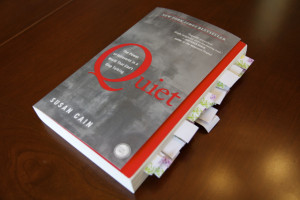Review of MotherStyles: Using Personality Type to Discover Your Parenting Strengths by Janet P. Penley with Diane Eble
The Emperor from Star Wars. Draco Malfoy from Harry Potter. O’Brien from Downton Abbey. What do they have in common, other than being cruel, heartless, nasty pieces of work? They’re all INTJs on the Myers-Briggs scale.
Just like me.
I’ve known my type for a while now – iDad and I did a version of the Myers-Briggs personality assessment before we got married. It measures your preferences in four areas, each correlating to a letter:
- Introversion vs. Extroversion: Do you draw energy from being alone or being with others?
- Sensing vs. iNtuitive: Do you evaluate information pragmatically or by adding meaning?
- Feeling vs. Thinking: Do you evaluate situations emotionally or logically?
- Judging vs. Perceiving: Do you prefer to have a routine or go with the flow?
There’s a much more detailed breakdown on the Myers-Briggs Foundation website. And here’s a quick quiz if you’re interested in finding out your type. I have a strong preference for introversion and judging, and I was more middle-of-the-road on the other two. According to the people making up fun internet graphics, this adds up to being kinda evil.
So that’s why I was glad to read, in Janet P. Penley’s book MotherStyles, that INTJs are also “Individual Integrity” mothers. That sounds much more positive. The book talks about the strengths and struggles each of the 16 Myers-Briggs types faces as a mother. Penley argues that anyone can be a good parent by knowing what works (and doesn’t) for their personality.
Penley herself is an introvert (an INFJ), and she talks openly about her parenting burnout before she understood that fact. But she and her co-author interviewed hundreds of moms of all type-stripes, and after a nice introductory section that explains each attribute in depth, the book lists strengths and struggles for each type of mom.
I definitely identified with the INTJ challenges – the chaos of family life, having confidence in my mothering skills, and living a balanced life. And I will try to do a better job appreciating my strengths (according to Penley, that’s being a non-conformist, being persistent, thinking deeply, and expecting the best from myself and others).
Reading about the other 15 personality types will give you insight into how your own mom, your mother-in-law, your friends, and/or your spouse might operate. (Dads are definitely covered – Penley says 80% of what’s in the book also applies to fathers). One of the basic tenets of the Myers-Briggs system is that no one type is better than another – but people are different. Knowing what lights others up and what drains them is a good reminder that parenting isn’t easy for anyone, and that even though some things you struggle with come naturally to other people, the reverse is also true.
The technique applies to kids, too – starting around age 8, most kids are settled into their personalities enough for you to figure out where they land for each of these traits. Even if they’re younger, though, you can probably guess about certain things. Doodlebug has always loved imaginative play and art, which suggests she’s an Intuitive sort. And reading this book made me realize she falls on the Feeling side of the scale.
You can even type your family – if you know the personality type for each person, you can figure out which traits are dominant in your household. Like I’ve said before, our family is definitely an introverted one, which works great for the three of us. But if Doodlebug had turned out to be an extrovert? That would be challenging, for her and for her parents.
This led me to my biggest lightbulb moment – when I realized exactly why summer is so stressful for me. I always push myself to create a laidback, go-with-the-flow atmosphere for our family, which is exactly the opposite of how I prefer to operate. And, as Penley points out many times, working against your type is possible, but it’ll cost you.
So I will be taking my 2 hours of work time every day this summer. Because if not, I might turn into the kind of person who leaves bars of soap in dangerous locations, shoots blue lightning at Jedi knights, or joins the Death Eaters. You have all been warned.
— Kathy
P.S. There’s a whole MotherStyles website, with more info about the book, articles, and even a mini self-care plan for each type of mom.



